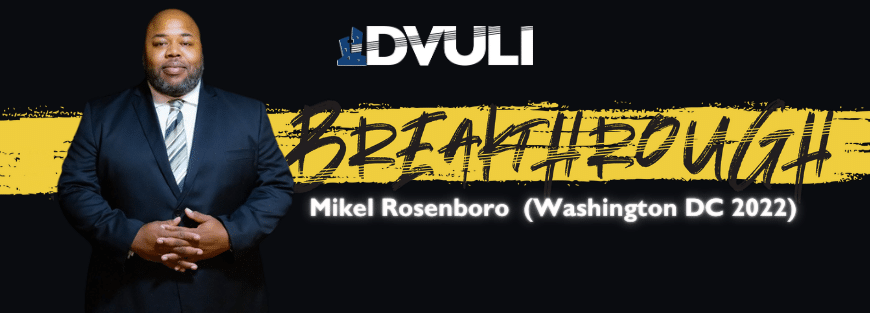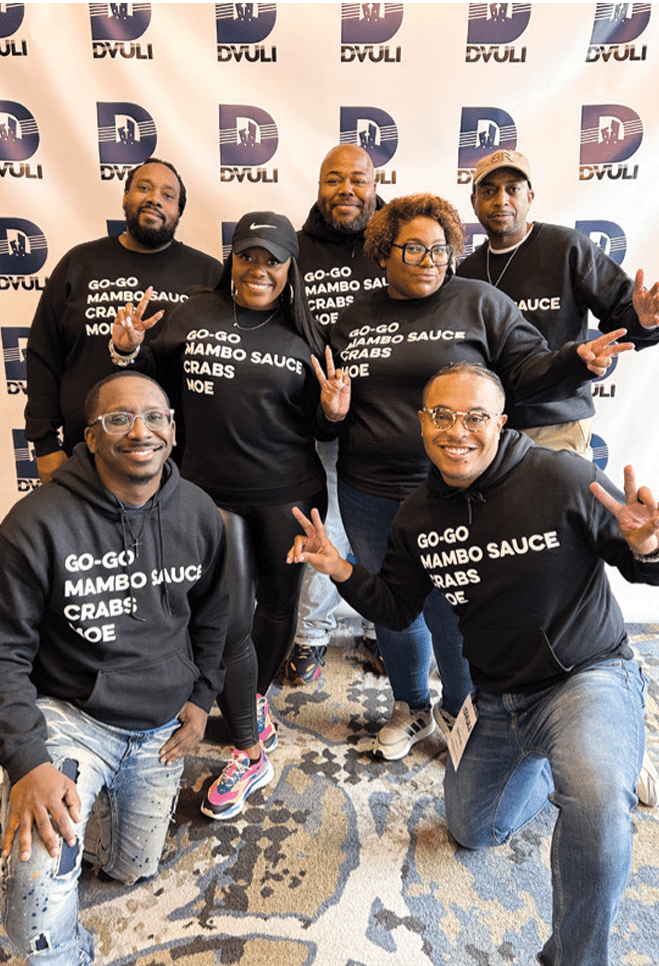Breakthrough: Mikel Rosenboro
Posted by: DVULI | May 28, 2024

By Ashley Noelle Ver Beek (Contributor)
Nestled on a hill above Atlanta’s I-20 stands a building called the Atlanta Stockade, known as “Glencastle.” The imposing 1890s fortress holds a dark, painful history. It served as a post-Civil War prison and then was abandoned for decades. Years later, a team of architects saw a vision as they walked through the deserted halls, believing the old castle could be transformed.
For Mikel Rosenboro (Washington DC 2022), the “Castle” was a powerful metaphor for his own transformation during the DVULI program and beyond. “That castle was me!” he exclaimed. “No matter where I was in my life, I always had that one person who would see value in me.” Mikel’s mentors saw a greater vision in store for him—one of purpose and leadership. In Mikel’s own words, “I grew up in one of the worst neighborhoods in DC where people watched you make money and then robbed you later that night.” He continued, “You grow trust issues from those types of things.” Lack of trust caused Mikel to isolate himself. Eventually, he began to move toward ministry.
In Mikel’s own words, “I grew up in one of the worst neighborhoods in DC where people watched you make money and then robbed you later that night.” He continued, “You grow trust issues from those types of things.” Lack of trust caused Mikel to isolate himself. Eventually, he began to move toward ministry.
For more than a decade, Mikel has served as a dynamic pastor and youth mentor. The ministries he was involved in came with valuable experience but bred isolation. A lack of clear boundaries stretched him thin. Ministry relationships were transactional, not empowering. Mikel was overextending himself in his work, costing him his relationship with his family. “When you’ve lived in trauma, chaos is normal,” he said. “I was running, ducking, and dodging being at home. I didn’t focus on my family life— just ministry.”
In 2022, Mikel joined a DVULI cohort, and things began to shift. He said, “I’ve never had interaction with people who, just being around them, you feel the presence of God.” Mikel described how his fellow cohort members were all leaders of large ministries, and while he was pastoring about 35 people, they made him feel empowered and uplifted.
“I’ve often dealt with people who elevated me to handcuff me,” he said of being used by leadership in the past. “This was different—my cohort never wanted anything in return.” Mikel’s DVULI peers wanted him to succeed and embodied interdependence. He relished their mutual support as he developed his leadership vision and made plans to plant a church. They encouraged him by helping him put policies together and speaking words of affirmation over him.
“I’ve often dealt with people who elevated me to handcuff me,” he said of being used by leadership in the past. “This was different—my cohort never wanted anything in return.”
Mikel knew God was shaping him. “I didn’t know what my breakthrough plan was going to be until NC2 because that first year, God was rebuilding me,” he recalled. “Chaos left when I started to create balance and spend quality time with my wife and kids. With the help and encouragement of my cohort, I created and implemented sustainable policies and procedures for my existing ministry. God gave me a vision, and I put things in place so a new ministry could be built while the old one could still stand.”
On January 7, 2024, Mikel experienced breakthrough as he launched a new church, God’s Assembly of Believers, in Capitol Heights, Maryland. This vibrant Apostolic church’s mission is to “empower the community to pursue God’s kingdom through love and life-changing connection.” Mikel serves as the pastor of the congregation.
Mikel keeps in contact with his cohort, who are now close friends and accountability partners. His ongoing vision for the church echoes that of the “Castle” in Atlanta, which was restored into housing and services for people of lower socioeconomic status. “Similar to the castle, I want to provide mental health residential services, psychiatric rehabilitation services, and psychotherapy. It’s not only about creating wholeness for the soul; it’s about creating wholeness for the person.” Mikel is currently pursuing a Master of Arts in Mental Health Counseling, and his wife, Iesha, is also a therapist.
“Similar to the castle, I want to provide mental health residential services, psychiatric rehabilitation services, and psychotherapy. It’s not only about creating wholeness for the soul; it’s about creating wholeness for the person.”
His powerful transformation from isolation to interdependence has allowed him to be used by God to empower others to encounter healing. From painful histories and forsaken castles, new life springs up. To those unsure of where growth might take them, Mikel graciously offers his wisdom: “Trust the Process!”

Mikel (back row center) and some of his Washington DC cohort members at NC2.
# # #


